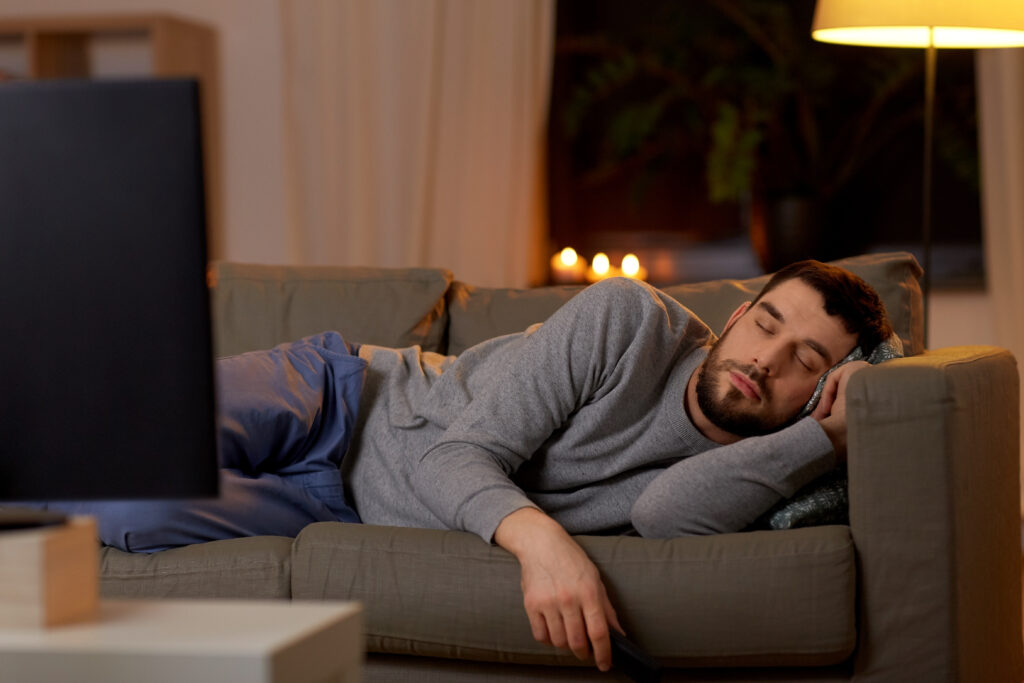
In a world where the entirety of television history is just a few clicks away, the phenomenon of binge-watching has rapidly become a universal pastime. This cultural shift, driven by the convenience and allure of streaming services, prompts the all-too-familiar battle between the need to sleep and the temptation to watch “just one more episode.” Our deep dives into fictional worlds often come at the expense of our real-world need for rest, setting the stage for a closer examination of how late-night screen time is reshaping our sleep habits.
Researchers have found that exposure to the blue light emitted by screens can significantly disrupt our natural sleep cycle. Electronic devices, such as smartphones, tablets, and televisions, emit a spectrum of light that includes blue wavelengths. This light interferes with the production of melatonin, the hormone responsible for regulating sleep and wake cycles. By suppressing melatonin levels, blue light can delay sleep onset, decrease the quality of sleep, and disrupt the body’s circadian rhythms, leading to a cascade of potential health issues. Understanding these impacts is crucial for anyone trying to balance the urge to binge-watch with the necessity of getting adequate rest.
The psychological ramifications of late-night viewing are not to be underestimated, particularly in how they contribute to altering sleep patterns. Engaging in the high-octane drama or cliffhangers of our favorite shows right before bed naturally elevates our alertness, making the transition to sleep more challenging. This heightened state of arousal can not only delay when we fall asleep but also compromise the quality of our rest. Additionally, the immersive nature of binge-watching can amplify anxiety levels, especially if the content is suspenseful or emotionally charged. The escalating cycle of excitement and stress holds our minds hostage, preventing the necessary relaxation and calm required to drift off into a peaceful slumber. Recognizing and addressing these psychological effects is essential for those seeking to harmonize their love for late-night binge-watching with their need for rejuvenating sleep.
The link between insufficient sleep and a multitude of health complications cannot be overstated, as research increasingly points to poor sleep as a potent risk factor for conditions such as obesity, diabetes, and cardiovascular disease. This is particularly concerning in the context of binge-watching, where the sedentary behavior of prolonged sitting further compounds the issue, exacerbating the risk of these chronic conditions. Additionally, the extended exposure to screens during these late-night viewing marathons not only affects our sleep patterns but can also strain our eyes and negatively impact our posture, leading to a host of physical discomforts including back pain, neck strain, and headaches. Cultivating awareness about these health implications is the first step towards fostering habits that prioritize both our physical well-being and our entertainment preferences.
Implementing healthier viewing habits is essential in mitigating the negative impacts of binge-watching on sleep and overall wellness. Establishing strict personal limits on screen time before bedtime can significantly aid in disengaging from the digital world, allowing our minds to prepare for rest. Additionally, leveraging technology solutions like blue light filters can minimize blue light exposure, thereby reducing its detrimental effects on melatonin production and sleep quality. Equally important is the cultivation of a pre-sleep routine focused on relaxation, such as reading, meditating, or practicing gentle yoga, which can ease the transition into sleep. By prioritizing these strategies, individuals can enjoy their favorite shows without compromising their sleep health, striking a balance between entertainment and well-being.
In the era of endless streaming, it’s clear that our love for binge-watching can clash with our biological need for restful sleep. By understanding the science behind sleep disruption and recognizing the profound effects of late-night screen time, viewers can take proactive steps towards healthier habits. Simple adjustments, like limiting screen time, adjusting our environment, and fostering relaxation before bed, can go a long way in ensuring that our desire to catch up on the latest series doesn’t come at the expense of our sleep or overall health. With mindful consumption and the right practices, it’s possible to enjoy the best of both worlds – great entertainment and good night’s sleep.


